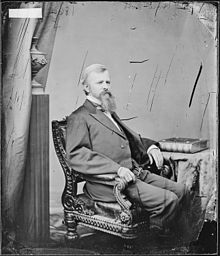Amasa Cobb
| Amasa Cobb | |
|---|---|
 |
|
| Member of the U.S. House of Representatives from Wisconsin's 3rd district |
|
|
In office March 4, 1863 – March 3, 1871 |
|
| Preceded by | A. Scott Sloan |
| Succeeded by | J. Allen Barber |
| Member of the Wisconsin State Assembly | |
|
In office 1860-1863 |
|
| Member of the Wisconsin Senate | |
|
In office 1855 |
|
| Personal details | |
| Born |
September 27, 1823 Crawford County, Illinois |
| Died | July 5, 1905 (aged 81) Los Angeles, California |
| Political party | Republican |
| Military service | |
| Allegiance |
United States of America Union |
| Service/branch |
United States Army Union Army |
| Rank |
|
| Battles/wars | American Civil War |
Amasa Cobb (September 27, 1823 – July 5, 1905) was a Republican Wisconsin politician and an officer in the Union Army during the American Civil War.
Born in Crawford County, Illinois, near Palestine, Illinois, Cobb moved to the Wisconsin Territory in 1842 and mined for lead. He served in the Mexican-American War as a private. After the war he studied law, passed the bar and set up practice in Mineral Point, Wisconsin. He was a district attorney from 1850 to 1854, then was elected to the Wisconsin State Senate in 1855, serving until 1856. During his term, he was also the adjutant general of Wisconsin from 1855 to 1858. He became a member of the Wisconsin State Assembly in 1860 and served as speaker in 1861.
At the outset of the Civil War, on July 12, 1861, he joined the Union army as Colonel of the 5th Wisconsin Infantry Regiment, serving in the Army of the Potomac in several campaigns and battles. Most notably, Cobb succeeded Brigadier General Winfield S. Hancock in command of a brigade in second division VI Corps at the Battle of Antietam, after Hancock was transferred to command the first division II Corps. In the fall of 1862, he was elected to the 38th Congress from Wisconsin's 3rd congressional district for a two-year term. Cobb was reelected to the 39th, 40th, and 41st Congresses, serving until 1871. His last action with 5th Wisconsin Infantry was the Battle of Fredericksburg.
...
Wikipedia
